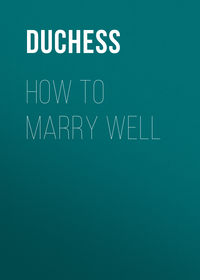 полная версия
полная версияFaith and Unfaith: A Novel
"Do you like teaching?" asks he, idly, more for the sake of hearing her plaintive voice again, than from any great desire to know.
"Like it?" She stops short on the pretty woodland path, and confronts him curiously: "Now, do you think I could like it? I don't, then! I perfectly hate it! The perpetual over and over again, the knowledge that to-morrow will always be as to-day, the feeling that one can't get away from it, is maddening. And then there are the mistakes, and the false notes, and everything. What a question to ask me! Did any one ever like it, I wonder!"
There is some passion, and a great deal of petulance, in her tone; and her lovely flower-like face flushes warmly, and there is something besides in her expression that is reproachful. Dorian begins to hate himself. How could he have asked her such a senseless question? He hesitates, hardly knowing what to say to her, so deep is his sympathy; and so, before he has time to decide on any course, she speaks again.
"It is so monotonous," she says, wearily. "One goes to bed only to get up again; and one gets up with no expectation of change except to go to bed again."
"'One dem'd horrid grind,'" quotes Mr. Branscombe, in a low tone. He is filled with honest pity for her. Instinctively he puts out his hand, and takes one of hers, and presses it ever so gently. "Poor child!" he says, from his heart. To him, with her baby face, and her odd impulsive manner, that changes and varies with every thought, she is merely a child.
She looks at him, and shakes her head.
"You must not think me unhappy," she says, hastily. "I am not that. I was twice as unhappy before I came here. Everybody now is so kind to me, – Clarissa, and the Redmonds, and" – with another glance from under the long lashes – "you, and – Mr. Hastings."
"The curate?" says Dorian, in such a tone as compels Miss Broughton, on the instant, to believe that he and Mr. Hastings are at deadly feud.
"I thought you knew him," she says, with some hesitation.
"I have met him," returns he, "generally, I think, on tennis-grounds. He can run about a good deal, but it seems a pity to waste a good bat on him. He never hits a ball by any chance, and as for serving – I don't think I swore for six months until the last time I met him."
"Why, what did he do?"
"More than I can recall in a hurry. For one thing, he drank more tea than any four people together that ever I knew."
"Was that all? I see no reason why any one should be ashamed of liking tea."
"Neither do I. On the contrary, one should be proud of it. It betrays such meekness, such simplicity, such contentment. I myself am not fond of tea, – a fact I deplore morning, noon, and night."
"It is a mere matter of education," says Georgie, laughing. "I used not to care for it, except at breakfast, and now I love it."
"Do you? I wish with all my heart I was good souchong," says Mr. Branscombe, at which she laughs again.
"One can't have all one's desires," she says. "Now, with me music is a passion; yet I have never heard any of the great singers of the age. Isn't that hard?"
"For you it must be, indeed. But how is it you haven't?"
"Because I have no time, no money, no – no anything."
"What a hesitation! Tell me what the 'anything' stands for."
"Well, I meant no home, – that is, no husband, I suppose," says Georgie. She is quite unconcerned, and smiles at him very prettily as she says it. Of the fact that he is actually in love with her, she is totally unaware.
"That is a regret likely to be of short standing," he says, his eyes on hers. But her thoughts are far away, and she hardly heeds the warmth of his gaze or the evident meaning in his tone.
"I suppose if I did marry somebody he would take me to hear all the great people?" she says, a little doubtfully, looking at him as though for confirmation of her hope.
"I should think he would take you wherever you wanted to go, and to hear whatever you wished to hear," he says, slowly.
"What a charming picture you conjure up!" says Georgie, looking at him. "You encourage me. The very first rich man that asks me to marry him, I shall say 'Yes' to."
"You have made up your mind, then, to marry for money?" He is watching her closely, and his brow has contracted a good deal, and his lips show some pain.
"I have made up my mind to nothing. Perhaps I haven't one to make up," – lightly. "But I hate teaching, and I hate being poor. That is all. But we were not talking of that. We were thinking of Mr. Hastings. At all events, you must confess he reads well, and that is something! Almost everybody reads badly."
"They do," says Branscombe, meekly. "I do. Unless in words of one syllable, I can't read at all. So the curate has the pull over me there. Indeed, I begin to feel myself nowhere beside the curate. He can read well, and drink tea well, and I can't do either."
"Why, here we are at the vicarage," says Georgie, in a tone of distinct surprise, that is flattering to the last degree. "I didn't think we were half so close to it. I am so glad I met you, because, do you know, the walk hasn't seemed nearly so long as usual. Well, good-by."
"May I have those violets?" says Branscombe, pointing to a little bunch of those fair comers of the spring that lies upon her breast.
"You may," she says, detaching them from her gown and giving them to him willingly, kindly, but without a particle of the tender confusion he would gladly have seen in her. "They are rather faded," she says, with some disappointment; "you could have picked yourself a sweeter bunch on your way home."
"I hardly think so."
"Well, good-by again," she says, turning up to him the most bewitching and delicious of small faces, "and be sure you put my poor flowers in water. They will live the longer for it."
"They shall live forever. A hundred years hence, were you to ask me where they were, I swear I should be able to show them."
"A very safe oath," says Miss Broughton; and then she gives him her hand, and parts from him, and runs all the way down the short avenue to the house, leaving him to turn and go on to Gowran.
CHAPTER XX
"There have been hearts whose friendship gaveThem thoughts at once both soft and grave."In the drawing-room he finds Clarissa sitting among innumerable spring offerings. The whole place seems alive with them. "The breath of flowers is on the air." Primroses and violets shine out from tiny Etruscan vases, and little baskets of pale Belleek are hidden by clustering roses brought from the conservatory to make sweet the sitting-room of their mistress.
"I am so glad you have come," says Clarissa, rising with a smile to welcome him, as he comes up to her. "The day was beginning to drag a little. Come over here, and make yourself comfortable."
"That will I, right willingly, so it pleases you, madam," says Dorian, and straightway, sinking into the desirable lounging-chair she has pointed out, makes himself thoroughly happy.
A low bright fire is burning merrily; upon the rug a snow-white Persian cat sinks blinking; while Billy, the Irish terrier, whose head is bigger than his body, and whose hair is of the shabbiest, reclines gracefully upon an ottoman near. Clarissa, herself, is lying back upon a cushioned chair, looking particularly pretty, if a trifle indolent.
"Now for your news," she says, in the tone one adopts when expecting to be amused.
Dorian, lifting his arms, lays them behind his head.
"I wonder if ever in all my life I had any news," he says, meditatively. "After all, I begin to think I'm not much. Well, let me see: would it be news to say I met and talked with, and walked with your 'lassie wi' the lint-white locks'?"
"Georgie? You – . She was with me all the morning."
"So she told me."
"Ah? And how far did you go with her?"
"To the vicarage. As I had been there all the morning, I couldn't well go in again, – a fact I felt and deplored."
"I am glad you walked back with her," says Miss Peyton; but she doesn't look glad. "I hope you were nice to her?"
"Extremely nice: ask her if I wasn't. And our conversation was of the freshest. We both thought it was the warmest spring day we had ever known, until we remembered last Thursday, and then we agreed that was the warmest spring day we had ever known. And then we thought spring was preferable to summer. And, then, that Cissy Redmond would be very pretty if she hadn't a cocked nose. Don't look so amazed, my dear Clarissa: it was Miss Broughton's expression, not mine, and a very good one too, I think. We say a cocked hat; therefore why not a cocked nose? And then we said all education was a bore and a swindle, and then – . How old is she, Clarissa?"
"You mean Georgie?"
"Yes."
"Neither nineteen nor twenty."
"So much! Then I really think she is the youngest-looking girl I ever met at that age. She looks more like sweet seventeen."
"You think her pretty?"
"Rather more than that: she reminds me always of 'Maggie Lauder:'
"'Her face is as the summer cloud, whereonThe dawning sun delights to rest his rays.'And, again, surely Apollo loves to
"Play at hide-and-seek amid her golden hairs.'""Dorian, don't – don't make her unhappy," says Clarissa, blushing hotly.
"I wish I could," says Dorian. He laughs as he speaks, but there is truth hidden in his jesting tone. Oh, to make her feel something, – that cold indifferent child!
"No, no. I am in earnest," says Clarissa, a little anxiously. "Don't pay her too much attention, if you don't mean it."
"Perhaps I do mean it."
"She is very young," – ignoring his last speech altogether. "She is a perfect baby in some ways. It isn't kind of you, I think."
"My dear child, what am I doing? If I hand Miss Broughton a chair, or ask her if she would like another cup of tea, is that 'making her unhappy'? I really begin to think society is too moral for me. I shall give it up, and betake myself to Salt Lake City."
"You won't understand me," begins she, sitting more upright, as though desirous of argument; but he interrupts her.
"There you mistake me," he says. "My motives are quite pure. I am dying to understand you, only I can't. If you would try to be a little more lucid, all would be well; but why I am to be sat upon, and generally maltreated, because I walked a mile or so with a friend of yours, is more than I can grasp."
"I don't want to sit upon you," says Clarissa a little vexed.
"No! I dare say that chair is more comfortable."
"I don't want anything; I merely ask you to be careful. She is very young, and has seen few men; and if you persist in your attentions she may fall in love with you."
"I wish to goodness she would," says Branscombe; and then something in his own mind strikes him, and he leans back in his chair, and laughs aloud. There is, perhaps, more bitterness than mirth in his laugh; yet Miss Peyton hears only the mirth.
"I hope she won't," she says, severely. "Nothing would cause me greater sorrow. Underneath her childish manner there lies a passionate amount of feeling that, once called into play, would be impossible to check. Amuse yourself elsewhere, Dorian, unless you mean to marry her."
"Well, why shouldn't I marry her?" says Dorian.
"I see no reason why you shouldn't. I only know you have no intention whatever of doing so."
"If you keep on saying that over and over again, I dare say I shall want to marry her," says Dorian. "There is nothing like opposition for that kind of thing; you go and tell a fellow he can't and sha'n't marry such-and-such a girl, and ten to one but he goes and does it directly."
"Don't speak like that," says Clarissa, entreatingly: she is plainly unhappy.
"Like what? What nonsense you have been talking all this time! Has it never occurred to you that though, no doubt, I am endowed with many qualities above the average, still I am not an 'Adonis,' or an 'Apollo,' or an 'Admirable Crichton,' or any thing of that sort, and that it is probable your Miss Broughton might be in my society from this till the day she dies without experiencing a pang, as far as I am concerned."
"I don't know about 'Apollo' or 'Crichton,'" says Clarissa; "but let her alone. I want her to marry Mr. Hastings."
"The curate?" says Dorian, for the second time to day.
"Yes. Why should you be so amazed? He is very charming, and I think she likes him. He is very kind-hearted, and would make her happy; and she doesn't like teaching."
"I don't believe she likes Hastings," says Dorian; yet his heart dies within him as he remembers how she defended him about his unlimited affection for the cup that "cheers but not inebriates."
"I believe she does," says Clarissa.
"Can't you do something for me, Clarissa?" says Dorian, with a rather strained laugh: "you are evidently bent on making the entire country happy, yet you ignore my case. Even when I set my heart upon a woman, you instantly marry her to the curate. I hate curates! They are so mild, so inoffensive, so abominably respectable. It is almost criminal of you to insist on handing over to one of them that gay little friend of yours with the yellow hair. She will die of Hastings, in a month. The very next time I have the good fortune to find her alone, I shall feel it my duty to warn her off him."
"Does anybody ever take advice unless it falls in with their own wishes?" says Clarissa. "You may warn her as you will."
"I sha'n't warn her at all," says Dorian.
When he has left Clarissa, and is on his homeward way, this thought still haunts him. Can that pretty child be in love with the lanky young man in the long-tailed coat? She can't! No; it is impossible! Yet, how sure Clarissa seemed! and of course women understand each other, and perhaps Georgie had been pouring confidences of a tender nature into her ears. This last is a very unpleasant idea, and helps to decapitate three unoffending primroses.
Certainly she had defended that fellow very warmly (the curate is now "that fellow"), and had spoken of him a though she felt some keen interest in him. After all, what is it to him? (This somewhat savagely, and with the aid of a few more flowers.) If he was in love with her, it would be another thing; but as it is, – yes, as it is.
How often people have advised him to marry and settle down! Well, hang it all, he is surely as good to look at as the curate, and his position is better; and only a few hours ago she had expressed a desire to see something of life. What would Arthur think of —
His thoughts change. Georgie's riante lovely face fades into some deeper recess of his heart, and a gaunt old figure, and a face stern and disappointed, rises before him. Ever since that day at Sartoris, when the handkerchief had been discovered, a coldness, a nameless but stubborn shadow, had fallen between him and his uncle, – a shadow impossible to lift until some explanation be vouchsafed by the younger man.
Such an explanation it is out of Dorian's power to give. The occurrence altogether was unhappy, but really nothing worthy of a violent quarrel. Branscombe, as is his nature, pertinaciously thrusts the whole affair out of sight, refusing to let it trouble him, except on such occasions as the present, when it pushes itself upon him unawares, and will not be suppressed.
Horace has never been to Pullingham since the night of the ball, and his letters to Clarissa have been many and constant, so that Dorian's suspicions have somewhat languished, and are now, indeed, almost dead, he being slow to entertain evil thoughts of any one.
Ruth Annersley, too, though plainly desirous of avoiding his society ever since his meeting with her in the shrubberies, seems happy and content, if very quiet and subdued. Once, indeed, coming upon her unexpectedly, he had been startled by an expression in her eyes foreign to their usual calm; it was a look half terrified, half defiant, and it haunted him for some time afterwards. But the remembrance of that faded, too; and she had never afterwards risked the chance of a tête-à-tête with him.
Meantime, Miss Peyton's little romance about the Broughton-Hastings affair rather falls to bits. Georgie, taking advantage of an afternoon that sees the small Redmonds on the road to a juvenile party, goes up to Gowran, and, making her way to the morning room, runs to Clarissa and gives her a dainty little hug.
"Aren't you glad I have come?" she says, with the utmost naïveté. "I'm awfully glad myself. The children have all gone to the Dugdales', and so I am my own mistress."
"And so you came to me," says Clarissa.
"Yes, of course."
"And now, to make you happy," says Clarissa, meditatively.
"Don't take any thought about that. It is already an accomplished fact. I am with you, and therefore I am perfectly happy."
"Still, you so seldom get a holiday," goes on Clarissa, regretfully, which is a little unfair, as the Redmonds are the easiest-going people in the world, and have a sort of hankering after the giving of holidays and the encouragement of idleness generally. The vicar, indeed, is laden with a suppressed and carefully hidden theory that children should never do anything but laugh and sit in the sun. In his heart of hearts he condemns all Sunday-schools, as making the most blessed day one of toil, and a wearying of the flesh, to the little ones.
"Why, – why," said he, once, in an unguarded moment, bitterly repented of afterwards, "forbid them their rest on the Sabbath day?"
"What a pity the afternoon is so uncertain!" says Clarissa. "We might have gone for a nice long drive."
She goes over to the window, and gazes disconsolately at the huge shining drops that fling themselves heavily against the panes, and on the leaves and flowers outside; while
"The thirsty earth soaks up the rain,And drinks, and gapes for drink again.""I cannot feel anything to be a pity to-day," says Georgie. "I can feel only a sense of freedom. Clarissa, let us play a game of battledore and shuttlecock. I used to beat you at Brussels; try if you can beat me now."
Into the large hall they go, and, armed with battledores, commence their fray. Hither and thither flies the little white bird, backwards and forwards move the lithe figures of the girls. The game is at its height: it is just the absorbing moment, when 199 has been delivered, and received, and returned, when Georgie, stopping short suddenly, cries "Oh!" and 200 flutters to the ground.
Clarissa, who is standing with her back to the hall door, turns instinctively towards it, and sees Dorian Branscombe.
"I have disturbed you. I have come in at the wrong moment?" asks that young man, fearfully.
"Ah! you have spoiled our game. And we were so well into it. Your sudden entrance startled Georgie, and she missed her aim."
"I am sorry my mere presence should reduce Miss Broughton to a state of abject fright," says Dorian, speaking to Clarissa, but looking at Georgie.
Her arm is still half raised, her color deep and rich, her eyes larger, darker than usual; the excitement of the game is still full upon her. As Dorian speaks, her lips part, and a slow sweet smile creeps round them, and she looks earnestly at him, as though to assure him that she is making him a free present of it, – an assurance that heightens her beauty, to his mind. Gazing at her with open and sincere admiration, he tells himself that
"Nature might no more her child advance."
"Your presence would not frighten me," she says, shaking her head; "but it was – I don't know what; I only know that I forgot myself for the moment and missed my aim. Now, that was hard, because we were so near our second hundred. Why did you not come a little sooner or a little later?"
"Because 'a thoughtless animal is man,'" quotes he, his blue eyes full of contrition. "And the door was wide open, and the picture before me put all other thoughts out of my head. I wish I was a girl! I should do nothing but play battledore and shuttlecock from morning till night." Then, reproachfully, "I think you might both shake hands with me, especially as I can say only 'how d'ye do' and 'good-by' in one breath: I am bound to meet Arthur at three precisely."
"What a comfort!" says Clarissa, devoutly. "Then there is some faint chance we may be allowed to end our afternoon in peace!"
"If there is one thing on earth for which I have a keen admiration, it is candor," says Branscombe; "I thank you, Clarissa, for even this small touch of it. Miss Broughton, be candid too, and say you, at least, will regret me."
"I shall," says Georgie, with decided – and, it must be confessed, unexpected – promptness.
"Ha!" says Dorian, victoriously. "Now I am content to go. A fig for your incivility, Clarissa! At least I leave one true mourner behind."
"Two," says Clarissa, relentingly.
"Too late now; apology is useless! Well, I'm off. Can I do anything for either of you?"
"Yes; bring me up that little dog you promised me, – one of Sancho's puppies."
"You shall have the very prettiest to-morrow, in spite of your ill-treatment. And you, Miss Broughton, what can I do for you?"
He is looking tenderly at the small childish face, framed in gold, that is gazing at him smilingly from the distance.
"Me?" she says, waking, as if from a revery, with a faint blush. "Oh! give me my liberty." She says it jestingly, but with a somewhat sad shrug of her rounded shoulders, as she remembers the dismal school-room, and the restraint that, however gentle, is hateful to her gay, petulant nature. Her smile dies, and tears creep into her eyes.
In another moment she is laughing again; but months go by before Dorian forgets the sad little petition and the longing glance that accompanied it, and the sigh that was only half repressed.
"I like Mr. Branscombe so much," says Georgie, a little later on, when Dorian has disappeared. They have forsaken their late game, and are now in Clarissa's own room, standing in a deep oriel window that overlooks the long sweep of avenue on one side, and the parterre beneath where early spring flowers are gleaming wet with the rain that fell so heavily an hour ago.
"Every one likes Dorian," says Clarissa, pleasantly, but without her usual warmth when speaking of Branscombe. "He is a general favorite, and I think he knows it. He is like a spoiled child; he says what he likes to everyone, but nobody takes anything he says seriously."
This friendly hint is utterly thrown away. Miss Broughton understands it not at all.
"Yet sometimes he looks quite grave," she says, – "nearly as grave as Mr. Hastings when in his surplice, only not so solemn. That is all the difference."
"I like Mr. Hastings in his surplice," says Clarissa; "I think him very handsome: don't you?"
"Well – yes – . Only I wish his ears didn't stick out so much. Why do they? He always, somehow, makes me think of Midas."
"But you like him," persists Clarissa, feeling, however, a little crestfallen. It doesn't sound promising, this allusion to Mr. Hastings's ears.
"Ever so much," says Georgie, enthusiastically; "and really, you know, he can't help his ears. After all, how much worse a crooked eye would be!"
"Of course. And his eyes are really beautiful."
"You are not in love with him, are you?" says Miss Georgie, with an amused laugh; and again Clarissa's hopes sink to zero.
"No. But I am glad you are a friend of his. Does he – like you?"
"Yes, I think so: I am sure of it. Clarissa," – with hesitation, – "if I tell you something, will you promise me faithfully not to tell it again?"
"I promise faithfully, darling, if you wish it."
"It is something Mr. Hastings said to me last night, and though I was not told in words to keep it secret, still I think he would wish me to be silent about it for – for a while. There can't be any harm in confiding it to you, can there? You are such an old friend of both."
"Not the slightest harm," says Miss Peyton, with conviction. Woman-like, she is burning with curiosity. Not for an instant does she doubt that one of her greatest wishes is about to be fulfilled: Mr. Hastings, who has a small though not insignificant income of his own, independent of the Church, is about to marry her dearest Georgie.
"Her dearest Georgie," raising herself a little from her recumbent position, leans her arm upon Clarissa's knee, and looks up into her face: there is importance largely mingled with delight in her fair features.









